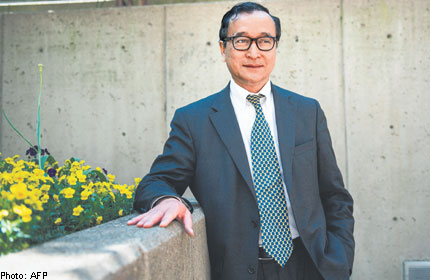
BANGKOK - Up until last Friday, Cambodian officials were prepared to jail self-exiled opposition leader Sam Rainsy if he were to set foot in the country.
But he said he would return to Cambodia for the July 28 general election anyway, and face the threat of imprisonment for convictions he maintains were politically motivated.
In fact, when asked recently by a France 24 channel journalist if he would one day be Cambodia’s prime minister, he replied without hesitation: “It’s a matter of months. In a few months, Cambodia will have new leaders following a democratic change.”
Such is the bravado of the 64-year-old French-educated leader of the Cambodia National Rescue Party, who has survived assassination attempts, criminal convictions and defamation lawsuits in his three-decade-long political career.
Last week, the one-time finance minister dodged the bullet again, through a royal pardon that lifted an 11-year jail term for charges that include altering public documents.
Mr Rainsy’s name has been removed from the electoral roll and he cannot contest in this election. But the pardon will bring him face to face again with Cambodia’s long-time premier Hun Sen, whom he has accused of corruption as well as masterminding a 1997 grenade attack at an opposition rally.
The Phnom Penh-born Mr Rainsy, whose father Sam Sary and grandfather were prominent politicians, left for France in his teenage years and made a career in the financial world before returning to his home country in 1992.
Cambodia, then recovering from genocide and civil war, held elections one year later under the watch of a United Nations transitional authority. That was when Mr Rainsy got elected as the Siem Reap representative in the National Assembly on the royalist Funcinpec Party ticket.

The outspoken politician was finance minister for over a year before he was stripped of the post and expelled from the party in 1995 for not toeing the line.
He went on to set up the Khmer Nation Party. This was later renamed the Sam Rainsy Party, which won 26 out of the 123 National Assembly seats in the 2008 election.
Mr Rainsy, who is married to a fellow Cambodian politician, has lived abroad for various stretches in the past decade to evade jail sentences handed out for defamation and other convictions.
During this period, the country of 15 million has seen a decline in poverty rates as its economy expanded at about 10 per cent per year before the 2008 global financial crisis.
This year, the World Bank expects Cambodia’s economy to expand by 6.7 per cent, on the back of strong exports and growth in investments.
Mr Rainsy argues, however, that this growth is neither sustainable nor equitable, and was achieved at the expense of the country’s forest cover and villagers, who have been driven off their land.
In recent years, Cambodia has also benefited from generous aid and military support from China, a factor that has blunted American influence even as Mr Rainsy urges the West to pressure the country to embark on political reform.
For this year’s election, the Sam Rainsy Party has formed an alliance with the Human Rights Party under the umbrella of the Cambodia National Rescue Party.
Pundits expect Mr Hun Sen’s ruling Cambodian People’s Party to win again on July 28, given its previous two triumphs amid allegations of electoral fraud.
Mr Rainsy has his share of critics, who have accused him of being autocratic and milking Cambodians’ distrust of neighbouring Vietnam – which invaded the country in 1978 – for political support.
In 2009, he helped villagers uproot posts demarcating the border between both countries and accused the Cambodian government of letting Vietnam encroach on its land.
A Wall Street Journal report pointed out that this was a matter that affected relatively few Cambodians.
But Mr Rainsy still holds appeal as a democracy icon, a theme that he keeps returning to.
In a statement released by his party last week after the pardon, he said: “My return is no more than a step on a long journey towards achieving self-determination for Cambodia.”
tanhy@sph.com.sg

